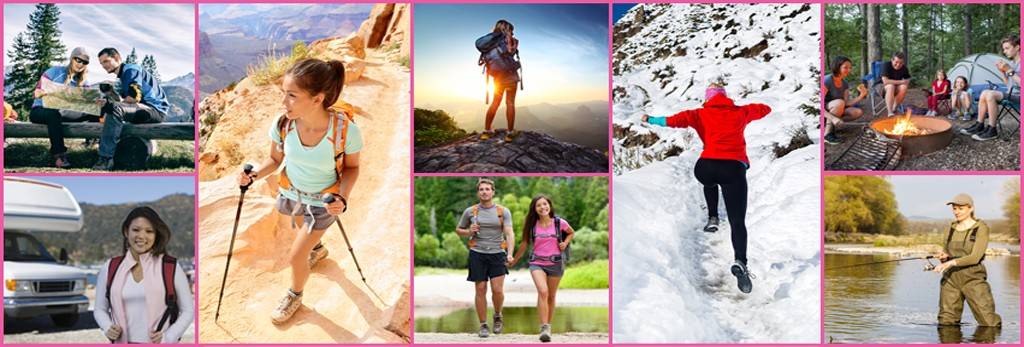
Isabella Adams walks us through the confusion around the best foods for long distance backpacking..
Factual, practical, and easy; tips that make long-distance backpacking convenient with minimal effort. Whether you’re worried about the weight of a backpack or how to put together a list of food and nutrients, this article covers all information regarding light packing and the importance of high-calorie foods and macronutrients with vitamins and minerals needed for sustainable and endurant hiking.
Contents
Choosing the Right Foods for Long-Distance Backpacking
Going on a long-distance hike is a challenging sport; choosing the proper meals and food makes all the difference. Food fuels the body with energy from calorie consumption; the stomach breaks down carbohydrates, fat, and proteins to release ATP, generating muscle energy. Such nutrients can be found in surprisingly small snacks that can be easily prepared and packed while hiking.
Nutritional Considerations
The average daily calorie intake is 2000 calories for women and 2500 for men to function well daily. However, calorie intake should be more than just the average when you are doing a hard workout such as long-distance hiking. Healthy, high-calorie foods are a great way to achieve those calorie goals.
Balanced macronutrients are a healthy measure of carbohydrates, fats, and protein. The body needs a combination of these three for sustainable energy. It’s worth noting that fats provide the highest energy at 9 calories per gram, compared to 4 calories per gram for protein and carbohydrates.

Vitamins and minerals are also essential for sustaining performance during hiking. Hiking trails can quickly deplete energy sources, and individuals may become dehydrated and experience cramps or discomfort. Magnesium is perfect for avoiding cramps as it helps soothe muscles, and the recommended daily value is 420 mg.
Dark chocolate contains 65 mg of magnesium per 28 g and prebiotic fibers, which are great for maintaining a healthy gut. Vitamin C is excellent for maintaining energy levels and reducing fatigue. One lemon contains approximately 30 mg of vitamin C, and adding a couple of slices to a water bottle is refreshing and helps retain the vitamin.
Dehydrated foods are a backpacker’s best friend; dehydration helps preserve nutritional value while increasing fiber content. They have a long shelf life and contain zero preservatives, and dehydrated food contains less water which reduces their weight and decreases the chance of microbial growth.
Proper Food Handling and Storage
Ensuring that all snacks and meals are properly stored is equally important to selecting the food. Although insulated food containers may preserve heat for a short period, it is better to carry chilled food.
Instead of conventional Tupperware, a soft cooler decreases weight, provides storage space, and is insulated, keeping food cool. Using foil helps keep the food cold and reflects the heat, especially when stored in coolers. Frozen water bottles are also a great hack and fit perfectly within the straps of the soft coolers. Although small, waist packs are handy and provide easy access to a couple of quick bites before going through your actual food storage.
Consider purchasing vacuum-sealed pouches and airtight food storage boxes for easy packing and safe handling.
Researching the area beforehand can help hikers forage food for natural and fresh ingredients.
Best Backpacking Food for Sustained Energy
 Rice and Pasta: Instant noodles are easy to cook and delicious, but they are processed and can cause a short spike in blood sugar, making them unhealthy. Opting for non-instant Udon is a healthier substitute. The broth will help you rehydrate, and the carbohydrates will sustain the body’s energy.
Rice and Pasta: Instant noodles are easy to cook and delicious, but they are processed and can cause a short spike in blood sugar, making them unhealthy. Opting for non-instant Udon is a healthier substitute. The broth will help you rehydrate, and the carbohydrates will sustain the body’s energy.- Dehydrated Meals: Dehydrated foods are lightweight, compacted, and extremely easy to prepare. They can be made at home with a food dehydrator or purchased packed dehydrated foods specifically for hiking and backpacking.
To rehydrate the meal, you can pour hot water on it and wait around 10 minutes until the food is fully rehydrated. To get optimal results, soak it in lukewarm water for 5 minutes, slowly bring it to a boil, and let it simmer for around 5 to 10 mins, turn off the heat and allow the food to sit until fully hydrated. - Instant Oatmeal and Granola: Carb-loading is always recommended for hikers; carbs increase glycogen for sustained performance and higher endurance. A cup of oatmeal contains 27 grams of carbohydrates, whereas a cup of granola contains 18 grams. For extra flavor, individuals can add a tbsp of honey which contains approximately 64 calories.
Best Snacks for Long Distance
 Energy Bars: Granola bars are quick to make, easy to store, and keep backpackers full for a while. They are high in fiber and protein which are a quick snack option to boost hikers and backpackers’ energy levels; they aid muscle recovery from hiking exertion, are full of nutrients, and are easy to digest.
Energy Bars: Granola bars are quick to make, easy to store, and keep backpackers full for a while. They are high in fiber and protein which are a quick snack option to boost hikers and backpackers’ energy levels; they aid muscle recovery from hiking exertion, are full of nutrients, and are easy to digest.- Nuts and Seeds: An important and nutritious snack that hikers should always pack is an assortment of nuts and seeds that are high in protein and contain healthy unsaturated fats. For instance, a handful of almonds is around 100 grams, providing 164 calories; and dry roasted Peanuts provide around 167 calories.
An alternative to this is to pack a couple of jars of high-quality nut butter that have no added sugar or salt. Nut butters are convenient high-nutrient foods that can be enjoyed with crackers, vegetable sticks, fruits, or even straight out of the jar with a spoon. - Dried Fruits: Organic dried fruits like cherries are rich in antioxidants and pain-reducing quality; they also help sustain blood sugar levels, reducing thirst. dried fruits like peaches and apricot contain potassium, a great electrolyte source; they help retain fluids and lower blood pressure levels.
- Jerky and Meat-Based Snacks: A cup size of dehydrated beef jerky contains 369 calories, rich in 30 grams of protein and approximately 5 grams of iron; beef jerky serving size of 116 calories helps immunity and sustains muscle mass. Turkey jerky and hard salami are two other options to consider.
- Cheese and Crackers: It’s important to pick durable cheeses during a hike; dry gouda and cheddar are easy to pack and go great with whole-grain crackers.
Choosing the right foods for long-distance backpacking is vital for sustained energy and durable performance. However, some snacks, such as energy bars, contain harmful ingredients, such as artificial sweeteners. Check the label before purchasing and avoid high fructose corn syrup and soy isolate, which can increase appetite and are highly processed. More so, products with the word hydrogenated are bad for health and specifically for the heart.
Lastly, no words can express the joy of hiking and exploring the remote terrains and wonderful landscapes. The meaning behind such a wonderful sport was best expressed by David McCullough JR. when he said: “Climb mountains not so the world can see you, but so you can see the world.”

What are your ideas for the Best Foods for Long Distance Backpacking?
We are keen to hear your thoughts. Let’s learn from each other. Please share in the comments below.
Isabella is an experienced nutritionist and a passionate freelance writer. She uses her knowledge and experience to write about trending nutrition topics and develop a healthy and joyous relationship with food and the body. Her tips help to make healthier lifestyle choices.



Thinking about vitamins and minerals while hiking is so important. Sometimes the easiest foods to bring aren’t going to give you the energy and replenish your body the best way.
These are amazing food tips for long distance backpacking. The body needs essential nutrients to survive and hiking needs high calorie intake of foods. Carrying food in light weight insulated coolers and foods like granola bars, easy to prepare dehydrated foods, udon instead of noodles, dried fruits, cheese crackers, jerky meats are convenient foods for long distance backpacking.Thanks for sharing the nutritional value for each of them.
What a good summary of best back packing foods! I usually keep nut/energy bars and water for long distance hikes. An addition of lemon to the water is such an easy and valuable tip that I often overlook. Chocolate is usually frowned upon for the calorie conscious but I love it that you add the benefit of having dark chocolate and not feel guilty about it!
I haven’t done long-distance backpacking, but I like to pack the snacks on this list for my several hours of hiking trips. They are easy to pack to a backpack, and not heavy. I’m glad I found out about the benefit of adding lemon to water from your article. I will add slices of lemon to my water next time I go hiking.
I have done only a few of long distance hikes, all of them guided, so I didn’t have to worry about bringing food with me. We had cooks who would set camp at lunch time, and cook ahead. For snacks, we would get bananas and oranges, as well as granola bars. When meeting locals on the trail, I would buy fresh passion fruits as well.
I have tried dehydrated meals before, even if I didn’t take them with me on a trail. I thought they are quite good, a fantastic option when you are in the wild and don’t have the means to cook proper food. They are so easy to make with only hot water.
Yes, long distance hiking definitely needs you to pack food that gives energy and sustain it for long period. I like the idea of protein bars and nuts. Dark chocolate is a great idea provided you are not hiking in hot weather. Aluminium foil is ideal for wrapping foods and keeping them insulated for a while. Love this blog post with a lot of nutritional information.
oh wow great writeup, I had no idea Dark chocolate contains 65 mg of magnesium per 28 g and prebiotic fibers, I’ll be sure to include those with Nuts and Seeds, Dehydrated Meals, and Protein Bars on my next long distance hike
I did not know there were so many options – but then again I do not do many long distance hikes. For the shorter ones I bring along a banana and energy bars. I do see the problem with longer distances where the food should be stored properly as you have pointed out. Great tips all in all!
I usually pack energy bars and trail mixes because they’ll contain a lot of different things. Protein, oats, rice, dried fruit, and nuts (and sometimes cacao or chocolate, yum!) keep me going when they’re in a healthy mix.
Long distance hiking sure does drive a need for energy dense foods. Hard to sometimes find the right mix of healthy options. Sadly for us, dark chocolate alone is not going to cut it! We like to pack protein bars for hikes but too many of them just melt. Better to get dried fruit and drier bars. We always make our own mix with dried fruits and salted nuts as a basic snack staple.
I would think any kind of protein would be good!
I have never been a camping or outdoor girl, but I stumbled on this blog and WOW! I kinda want to go camping now. Bookmarking this!
It’s important to consider snack ingredients like energy bars and avoid harmful additives such as high fructose corn syrup and soy isolate. It’s great to see someone emphasizing the importance of reading labels and avoiding highly processed foods. And I couldn’t agree more with David McCullough JR.’s sentiment about mountain climbing. It’s not about showing off to the world. It’s about experiencing the beauty and wonder of the world for yourself.
This would be awesome to be able to do! I did some long backpacking trips when I was younger but I’m not sure I was cut out for it. Being prepared is so important!
Well, I may not be an outdoor person, but I particularly liked the suggestions on dehydrated meals, energy bars, and nuts. These seem like practical choices for keeping energy levels up during strenuous treks.
Ah yes, rice and pasta are the go-to foods! I would nee some noodles somewhere in there. Long distance backpacking will surely go smoother with those around.
Great suggestions for long-distance backpacking foods. The dry gouda, cheddar, and whole-grain crackers sound like a perfect option.
Your guide to the best foods for long-distance backpacking is a trailblazer’s dream! The variety of nourishing options you’ve shared is incredibly helpful. Love how you prioritize energy and taste for adventurous journeys. Thanks for fueling our backpacking escapades with these smart and tasty choices! 🥾🏞️🍽️
I the longest hike I’ve done was about four hours. I took water, and we took a Vespa with us. It was hot day and I ran the final leg which I was happy about. You’ve inspired me to do more!
We don’t do long-distance hikes with the scouts yet, but these are great ideas! I usually pack a few protein bars when we go hiking in the National Parks as a family.
Backpacking is an exciting way to explore the wilderness or travel to foreign countries. I`d say nuts and seeds are portable, convenient options for backpackers.
Energy bars are great. I also love protein jelly, nuts and chocolates!
Thanks. I don’t go hiking anymore, but if I did these tips would be great.
Very helpful and I appreciate you talking about correct storage and handling. Two very important things that need to be addressed!
We just did some long distance backpacking. What you pack matters quite a lot.